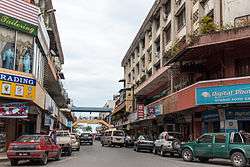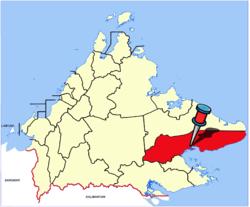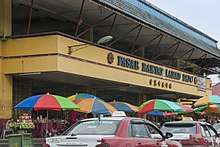Lahad Datu
| Lansdowne Datu Town Pekan Lahad Datu | |
|---|---|
| District Capital | |
 Lahad Datu town centre. | |
 | |
| Coordinates: 5°01′48″N 118°20′24″E / 5.03000°N 118.34000°ECoordinates: 5°01′48″N 118°20′24″E / 5.03000°N 118.34000°E | |
| Country |
|
| State |
|
| Division | Tawau |
| District | Lahad Datu |
| Population (2010) | |
| • Total | 27,887 |
Lahad Datu (Malay: Pekan Lahad Datu) is the capital of the Lahad Datu District in the Tawau Division of Sabah, Malaysia. Its population was estimated to be around 27,887 in 2010.[1] The town is surrounded by stretches of cocoa and palm oil plantations. It is also an important timber exporting port. The town has an airport for domestic flights.
History
A settlement is believed to have existed here in the 15th century, as excavations have unearthed Ming dynasty Chinese ceramics. Just east of Lahad Datu is the village of Tunku, a notorious base for pirates and slave traders in the 19th century.[2]
Based on a Jawi manuscript in the Ida'an language dated 1408 A.D, it is believed to be the first site in northern Borneo where Islam was first introduced. The Jawi manuscript gives an account of an Ida'an man named Abdullah in Darvel Bay who embraced Islam.
Foreign militant intrusion
On 23 September 1985, 15-20 armed foreign pirates from the neighbouring Philippines landed on this town, killing at least 21 people and injuring 11 others.[3][4]
Economy


Lahad Datu also has several palm oil refineries. The Palm Oil Industrial Cluster (POIC) is located near the Lahad Datu Port and received its first vessel on 1 March 2013.[5] It consists of 1,150 acres (5 km2) of land developed (with a centralised bulking facility and a jetty, currently under construction, which will have a draft of 20 metres, making it one of the few deep sea ports in the world) specifically for palm oil downstream industries. To date, 18 companies have bought land in POIC with 8 companies involved in the production of palm biodiesel. POIC is a wholly state-owned company under the purview of the Ministry of Industrial Development. Its chairman is the current minister, Datuk Dr. Ewon Ebin and the chief executive officer is Mr.Wong Yu Chin (ASDK,BSK).
Transportation
Lahad Datu is linked to other towns and districts via Federal Route 13, a part of larger Pan-Borneo Highway network in the east coast of Sabah. Works of constructing a new bypass road on Sandakan-Tawau route has been commenced on mid 2016, to relieve the traffic congestion on the town itself. Lahad Datu is served by many different methods of transportation. Taxis, buses and minibuses are abundant and provide connectivity around the town and other districts such as Sandakan and Tawau. Lahad Datu Port is a container port administered by Sabah Port Sdn. Bhd.
MASwings, a regional airline and subsidiary of Malaysia Airlines (MAB) provides five direct flights daily to and from Kota Kinabalu, the state’s capital.
References
- ↑ "Population by ethnic group, Local Authority area and state, Malaysia" (PDF). Department of Statistics, Malaysia. 2010. Archived from the original (PDF) on 27 February 2012. Retrieved 5 November 2017.
- ↑ Oxford Business Group. The Report: Sabah 2011. Oxford Business Group. pp. 12–. ISBN 978-1-907065-36-1.
- ↑ "Lahad Datu Recalls Its Blackest Monday". New Straits Times. 24 September 1987. Retrieved 30 October 2014.
- ↑ Masayuki Doi (30 October 1985). "Filipino pirates wreak havoc in a Malaysian island paradise". The Sydney Morning Herald. Retrieved 30 October 2014.
- ↑ "Maiden Voyage into POIC Port" (PDF). POIC Sabah Sdn. Bhd. 11 March 2013. Retrieved 14 March 2013.
External links
![]()